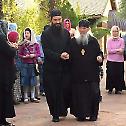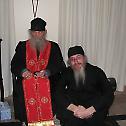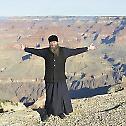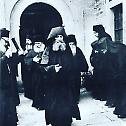Theology
His Holiness Catholicos-Patriarch Ilia’s Prayer on Nativity for the Coming Year
17. January 2020 - 14:10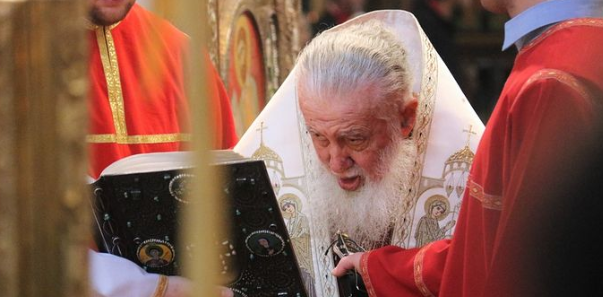 For the first time, we are seeing His Holiness Ilia’s Nativity Epistle for this year, which is not only profound Orthodox teaching but a powerful prayer for all. Before the end of Christmastide, we would like to present it to our readers.
For the first time, we are seeing His Holiness Ilia’s Nativity Epistle for this year, which is not only profound Orthodox teaching but a powerful prayer for all. Before the end of Christmastide, we would like to present it to our readers.
Most Eminent Hierarchs, Reverend Fathers, Deacons, Monks and Nuns, Authorities of our Government, members of the Holy Orthodox Church of Georgia, Residents of Iberia and our compatriots who are now living in the countries beyond our land.
St. Basil the Great, Archbishop of Cæsarea in Cappadocia
13. January 2020 - 16:26![]() Saint Basil the Great, Archbishop of Caesarea in Cappadocia, “belongs not to the Church of Caesarea alone, nor merely to his own time, nor was he of benefit only to his own kinsmen, but rather to all lands and cities worldwide, and to all people he brought and still brings benefit, and for Christians he always was and will be a most salvific teacher.” Thus spoke Saint Basil’s contemporary, Saint Amphilochius, Bishop of Iconium.
Saint Basil the Great, Archbishop of Caesarea in Cappadocia, “belongs not to the Church of Caesarea alone, nor merely to his own time, nor was he of benefit only to his own kinsmen, but rather to all lands and cities worldwide, and to all people he brought and still brings benefit, and for Christians he always was and will be a most salvific teacher.” Thus spoke Saint Basil’s contemporary, Saint Amphilochius, Bishop of Iconium.
Saint Basil was born in the year 330 at Caesarea, the administrative center of Cappadocia. He was of illustrious lineage, famed for its eminence and wealth, and zealous for the Christian Faith. The saint’s grandfather and grandmother on his father’s side had to hide in the forests of Pontus for seven years during the persecution under Diocletian.
The Holy Protomartyr Stephen the Archdeacon
9. January 2020 - 0:14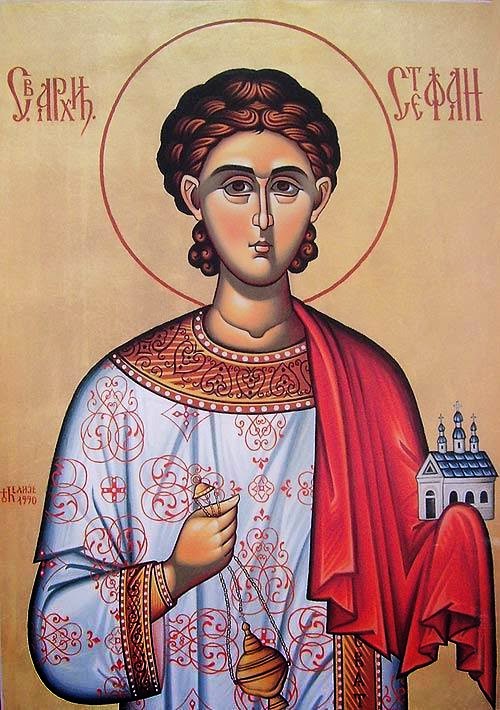 Stephen was a kinsman of the Apostle Paul and one of those Jews who lived in the Hellenic provinces. Stephen was the first of the seven deacons whom the holy apostles ordained and appointed to the service of assisting the poor in Jerusalem. For this, he is called the archdeacon.
Stephen was a kinsman of the Apostle Paul and one of those Jews who lived in the Hellenic provinces. Stephen was the first of the seven deacons whom the holy apostles ordained and appointed to the service of assisting the poor in Jerusalem. For this, he is called the archdeacon.
By the power of his faith, Stephen worked great miracles among the people. The wicked Jews disputed with him, but they were always defeated by his wisdom and the power of the Spirit, Who acted through him. Then the shameful Jews, accustomed to calumnies and slander, incited the people and the elders of the people against the innocent Stephen, slandering him as though he had blasphemed against God and against Moses. False witnesses were quickly found who confirmed this. Stephen then stood before the people, and all saw his face as it had been the face of an angel (Acts 6:15), that is, his face was illumined with the light of grace as was once the face of Moses when he spoke with God. Stephen opened his mouth and enumerated the many good works and miracles that God had performed in the past for the people of Israel, as well as the many crimes and opposition to God on the part of this people. He especially rebuked them for the killing of Christ the Lord, calling them betrayers and murderers (Acts 7:52). And while they gnashed their teeth, Stephen beheld and saw the heavens open and the glory of God. That which he saw, he declared to the Jews: Behold, I see the heavens opened and the Son of Man standing on the right hand of God! (Acts 7:56). Then the malicious men took him outside the city and stoned him to death. Among his persecutors was his kinsman Saul, later the Apostle Paul.
Contemplation on The Royal Hours on Christmas Eve: First Hour
6. January 2020 - 11:59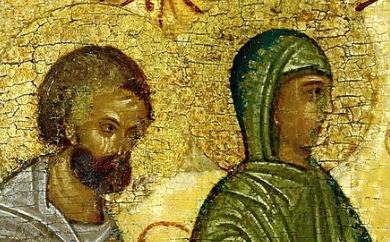 Mt. 1:18-25
Mt. 1:18-25
Now the birth of Jesus Christ was on this wise: When as his mother Mary was espoused to Joseph, before they came together, she was found with child of the Holy Ghost. Then Joseph her husband, being a just man, and not willing to make her a public example, was minded to put her away privily. But while he thought on these things, behold, the angel of the Lord appeared unto him in a dream, saying, Joseph, thou son of David, fear not to take unto thee Mary thy wife: for that which is conceived in her is of the Holy Ghost. And she shall bring forth a son, and thou shalt call his name Jesus: for he shall save his people from their sins. Now all this was done, that it might be fulfilled which was spoken of the Lord by the prophet, saying, Behold, a virgin shall be with child, and shall bring forth a son, and they shall call his name Emmanuel, which being interpreted is, God with us. Then Joseph being raised from sleep did as the angel of the Lord had bidden him, and took unto him his wife: And knew her not till she had brought forth her firstborn son: and he called his name Jesus.
Our Lord is born today, let us rejoice and be glad! No one may be sad today no matter what sorrow there be, no matter what losses we have suffered, because today is a festival of life for everyone. There is no more fear of death, for in the love that Christ has revealed to us there is no fear, and He gives to all the joy of eternal life.
Father of a Huge Family
20. December 2019 - 9:52The Memory of Elder Ephraim (Moraitis)
Elder Ephraim of Philotheou, or, as he is commonly called, of Arizona, has reposed in the Lord. He was the last surviving disciple of the great St. Joseph the Hesychast, and the fruits of his own life include nearly twenty monasteries in America and Canada and hundreds of thousands of people converted and strengthened in the faith around the world.
Three meetings,
thanks to which we learned
of the life of the future Elder Ephraim with the Elder Joseph
Venerable Alypius the Stylite of Adrianopolis
9. December 2019 - 12:36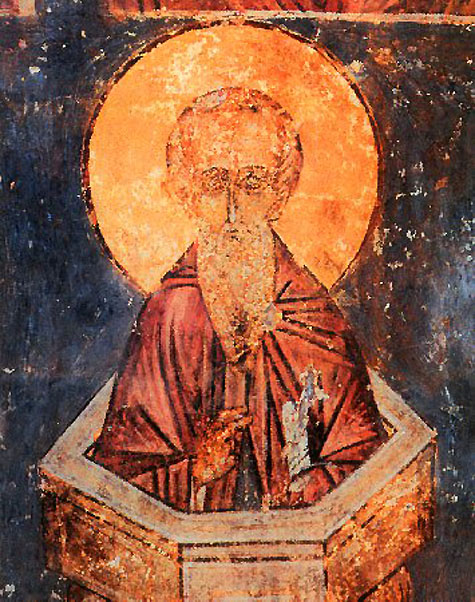 Saint Alypius the Stylite was born in the city of Adrianopolis in Paphlagonia. His mother, a Christian, was widowed early, and she sent her son to be educated by Bishop Theodore. She distributed her substance to the poor, then began to live an ascetic life near the church as a deaconess.
Saint Alypius the Stylite was born in the city of Adrianopolis in Paphlagonia. His mother, a Christian, was widowed early, and she sent her son to be educated by Bishop Theodore. She distributed her substance to the poor, then began to live an ascetic life near the church as a deaconess.
Saint Alypius, from his early years, wanted to devote his life to God and yearned for the solitary life, although Bishop Theodore would not give him permission to do so. Once, when Saint Alypius was accompanying his bishop to Constantinople, the holy Martyr Euphemia (September 16) appeared to him in a vision, summoning Saint Alypius to return to Adrianopolis and found a church in her name.
With contributions offered by believers in Adrianopolis, Saint Alypius did build a church in the name of the holy Martyr Euphemia, on the site of a dilapidated pagan temple infested by legions of devils. Beside the church, under the open sky, the saint erected a pillar over a pagan tomb. For fifty-three years Saint Alypius struggled upon the pillar, praying to God and teaching those who came to him.
The demons which infested the pagan cemetery fell upon the ascetic by night and pelted him with stones. Saint Alypius, wanted nothing to stand in the way of the attacks of the spirits of darkness, then even took down the boards that served him as a roof, protecting him from the rain and wind. In the face of the saint’s conquering steadfastness, the demons fled the place forever, which had been sanctified by his deed of voluntary martyrdom.
Fourteen years before his death, Saint Alypius was no longer able to stand. He was compelled to lie on his side because of the weakness of his legs, and endured grievous sufferings with humble gratitude. Around the saint’s pillar two monasteries sprang up: a men’s monastery on the one side, and a women’s monastery on the other. Saint Alypius introduced strict monastic rules for both monasteries and he directed both monasteries until his death. Saint Alypius reposed in the year 640, at age 118. The body of the venerable stylite was buried in the church he founded in honor of the holy Martyr Euphemia. The relics of the saint of God healed many of those who came in faith.
Source: OCA

